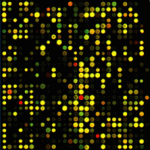Genomics
|
19 december 2014 22:00:45 |
| Core and accessory genome architecture in a group of Pseudomonas aeruginosa Mu-like phages (BMC Genomics) |
|
Tweet Background:
Bacteriophages that infect the opportunistic pathogen Pseudomonas aeruginosa have been classified into several groups. One of them, which includes temperate phage particles with icosahedral heads and long flexible tails, bears genomes whose architecture and replication mechanism, but not their nucleotide sequences, are like those of coliphage Mu. By comparing the genomic sequences of this group of P. aeruginosa phages one could draw conclusions about their ontogeny and evolution.
Results:
Two newly isolated Mu-like phages of P. aeruginosa are described and their genomes sequenced and compared with those available in the public data banks. The genome sequences of the two phages are similar to each other and to those of a group of P. aeruginosa transposable phages. Comparing twelve of these genomes revealed a common genomic architecture in the group. Each phage genome had numerous genes with homologues in all the other genomes and a set of variable genes specific for each genome. The first group, which comprised most of the genes with assigned functions, was named `core genome`, and the second group, containing mostly short ORFs without assigned functions was called `accessory genome`. Like in other phage groups, variable genes are confined to specific regions in the genome.
Conclusion:
Based on the known and inferred functions of some of the variable genes of the phages analyzed here, they appear to confer selective advantages for the phage survival under particular host conditions. We speculate that phages have developed a mechanism for horizontally acquiring genes to incorporate them at specific loci in the genome that help phage adaption to the selective pressures imposed by the host. |
| 105 viewsCategory: Genomics |
 Genomic and transcriptomic differences in community acquired methicillin resistant Staphylococcus aureus USA300 and USA400 strains (BMC Genomics) Genomic and transcriptomic differences in community acquired methicillin resistant Staphylococcus aureus USA300 and USA400 strains (BMC Genomics)An RNA sequencing transcriptome analysis of the high-temperature stressed tall fescue reveals novel insights into plant thermotolerance (BMC Genomics) 
|
| blog comments powered by Disqus |
MyJournals.org
The latest issues of all your favorite science journals on one page
The latest issues of all your favorite science journals on one page



